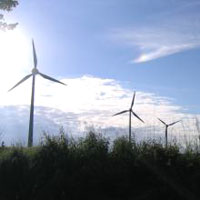
| Cape Cod Wind Project Green Light | 4 June 10 |
 After nine years of regulatory review, the US government gave the go-ahead April 29th, 2010 to the first American offshore wind farm, a fiercely contested project off the coast of Cape Cod. After nine years of regulatory review, the US government gave the go-ahead April 29th, 2010 to the first American offshore wind farm, a fiercely contested project off the coast of Cape Cod.The long-running struggle over the project underscores how divisive even a "clean" energy project can be in the United States. Environmental lawyer Robert Kennedy Jr., late Massachusetts Senator Edward Kennedy, current Massachusetts Senator Scott Brown, and nearby Aquinnah and Mashpee Wampanoag Tribes, The Humane Society of the United States, the International Fund for Animal Welfare, the Massachusetts Audubon Society all had opposed Cape Wind claiming it would create an industrial eyesore in a pristine area, disturb historically/cultural significant sites, inhibit fishing activities, and harm migratory birds. Developers say Cape Wind will provide 75 percent of the power for Cape Cod, Nantucket and Martha's Vineyard. It would also reduce carbon dioxide emissions by the equivalent of taking 175,000 cars off the road, officials said, and provide 1,000 construction jobs. Supporters include Greenpeace, Union of Concerned Scientists, World Wildlife Fund, NRDC, and United States Chamber of Commerce. On May 7, 2010 Cape Wind signed a 15-year power purchase agreement with the Massachusetts Department of Public Utilities. Cape Wind hopes to be producing energy by 2012. While it appears that the project may be moving forward, this proposal has been, and will likely continue to be, hotly disputed. View September 17, 2009 Manitoba Wildlands' news itemView April 28, 2010, New York Times article View Cape Wind news page View May 2, 2010 Digital Journal article View May 12, 2010 Huffington Post article View May 7, 2010 Businesswire press release View May 17, 2010 New York Times article Source: Cape Wind, New York Times, Businesswire |
|
 Print version Print version |
Top |
